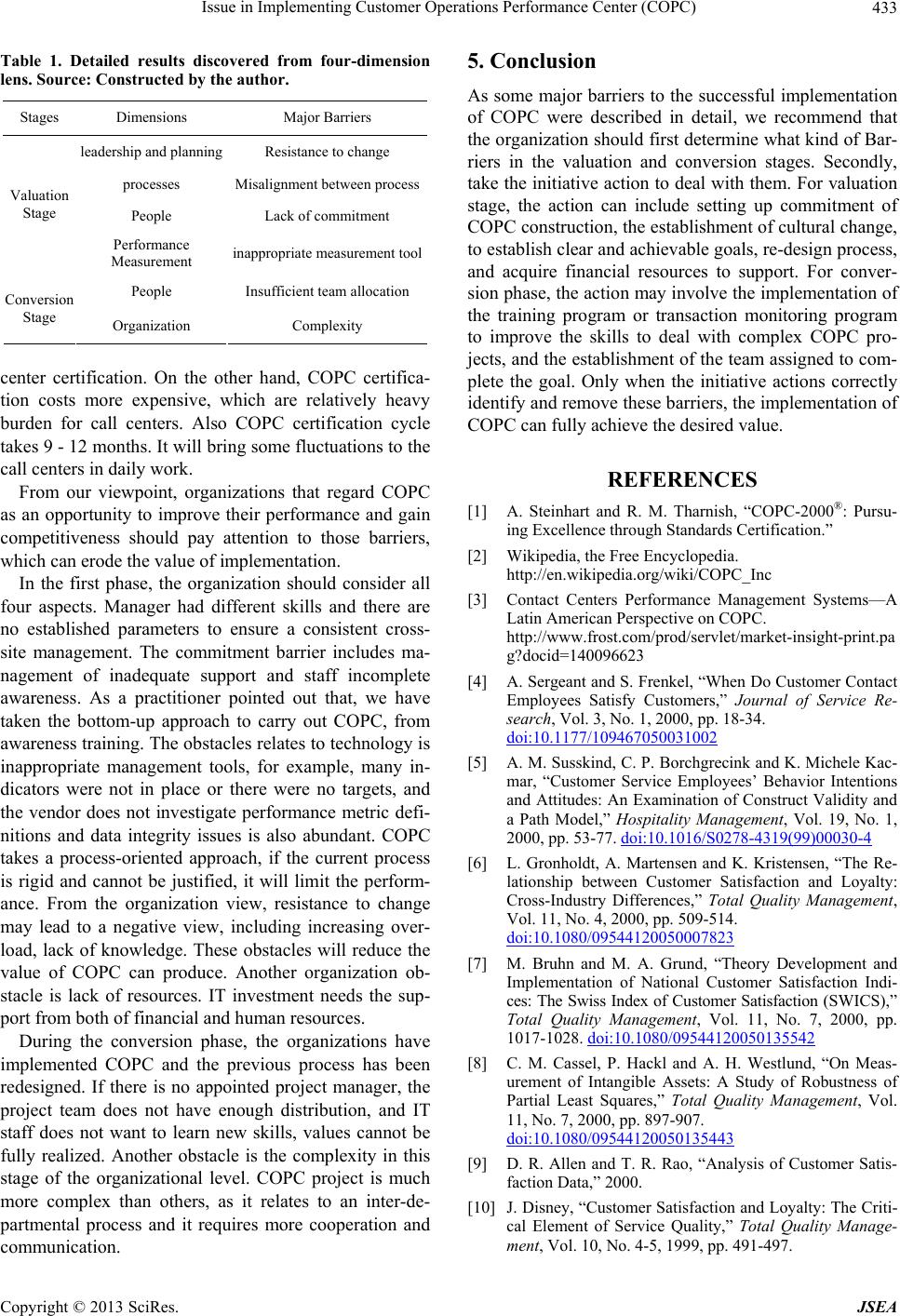
Issue in Implementing Customer Operations Performance Center (COPC)
Copyright © 2013 SciRes. JSEA
433
Table 1. Detailed results discovered from four-dimension
lens. Source: Constructed by the author.
Stages Dimensions Major Barriers
leadership and planningResistance to change
processes Misalignment between process
People Lack of commitment
Valuation
Stage
Performance
Measurement inappropriate measurement tool
People Insufficient team allocation
Conversion
Stage Organization Complexity
center certification. On the other hand, COPC certifica-
tion costs more expensive, which are relatively heavy
burden for call centers. Also COPC certification cycle
takes 9 - 12 months. It will bring some fluctuations to the
call centers in daily work.
From our viewpoint, organizations that regard COPC
as an opportunity to improve their performance and gain
competitiveness should pay attention to those barriers,
which can erode the value of implementation.
In the first phase, the organization should consider all
four aspects. Manager had different skills and there are
no established parameters to ensure a consistent cross-
site management. The commitment barrier includes ma-
nagement of inadequate support and staff incomplete
awareness. As a practitioner pointed out that, we have
taken the bottom-up approach to carry out COPC, from
awareness training. The obstacles relates to technology is
inappropriate management tools, for example, many in-
dicators were not in place or there were no targets, and
the vendor does not investigate performance metric defi-
nitions and data integrity issues is also abundant. COPC
takes a process-oriented approach, if the current process
is rigid and cannot be justified, it will limit the perform-
ance. From the organization view, resistance to change
may lead to a negative view, including increasing over-
load, lack of knowledge. These obstacles will reduce the
value of COPC can produce. Another organization ob-
stacle is lack of resources. IT investment needs the sup-
port from both of financial and human resources.
During the conversion phase, the organizations have
implemented COPC and the previous process has been
redesigned. If there is no appointed project manager, the
project team does not have enough distribution, and IT
staff does not want to learn new skills, values cannot be
fully realized. Another obstacle is the complexity in this
stage of the organizational level. COPC project is much
more complex than others, as it relates to an inter-de-
partmental process and it requires more cooperation and
ommunication. c
5. Conclusion
As some major barriers to the successful implementation
of COPC were described in detail, we recommend that
the organization should first determine what kind of Bar-
riers in the valuation and conversion stages. Secondly,
take the initiative action to deal with them. For valuation
stage, the action can include setting up commitment of
COPC construction, the establishment of cultural change,
to establish clear and ach ievable go als, re-design process,
and acquire financial resources to support. For conver-
sion phase, the action may involve the implementation of
the training program or transaction monitoring program
to improve the skills to deal with complex COPC pro-
jects, and the establish ment of the team assigned to com-
plete the goal. Only when the initiative actions correctly
identify and remove these barriers, the implementatio n of
COPC can fully achieve the desired value.
REFERENCES
[1] A. Steinhart and R. M. Tharnish, “COPC-2000®: Pursu-
ing Excellence through Standards Certification.”
[2] Wikipedia, the Free Encyclopedia.
http://en.wikipedia.org/wiki/COPC_Inc
[3] Contact Centers Performance Management Systems—A
Latin American Perspective on COPC.
http://www.frost.com/prod/servlet/market-insight-print.pa
g?docid=140096623
[4] A. Sergeant and S. Frenkel, “When Do Customer Contact
Employees Satisfy Customers,” Journal of Service Re-
search, Vol. 3, No. 1, 2000, pp. 18-34.
doi:10.1177/109467050031002
[5] A. M. Susskind, C. P. Borchgrecink and K. Michele Kac-
mar, “Customer Service Employees’ Behavior Intentions
and Attitudes: An Examination of Construct Validity and
a Path Model,” Hospitality Management, Vol. 19, No. 1,
2000, pp. 53-77. doi:10.1016/S0278-4319(99)00030-4
[6] L. Gronholdt, A. Martensen and K. Kristensen, “The Re-
lationship between Customer Satisfaction and Loyalty:
Cross-Industry Differences,” Total Quality Management,
Vol. 11, No. 4, 2000, pp. 509-514.
doi:10.1080/09544120050007823
[7] M. Bruhn and M. A. Grund, “Theory Development and
Implementation of National Customer Satisfaction Indi-
ces: The Swiss Index of Customer Satisfaction (SWI CS),”
Total Quality Management, Vol. 11, No. 7, 2000, pp.
1017-1028. doi:10.1080/09544120050135542
[8] C. M. Cassel, P. Hackl and A. H. Westlund, “On Meas-
urement of Intangible Assets: A Study of Robustness of
Partial Least Squares,” Total Quality Management, Vol.
11, No. 7, 2000, pp. 897-907.
doi:10.1080/09544120050135443
[9] D. R. Allen and T. R. Rao, “Analysis of Customer Satis-
faction Data,” 2000.
[10] J. Disney, “Customer Satisfaction and Loyalty: The Criti-
cal Element of Service Quality,” Total Quality Manage-
ment, Vol. 10, No. 4-5, 1999, pp. 491-497.